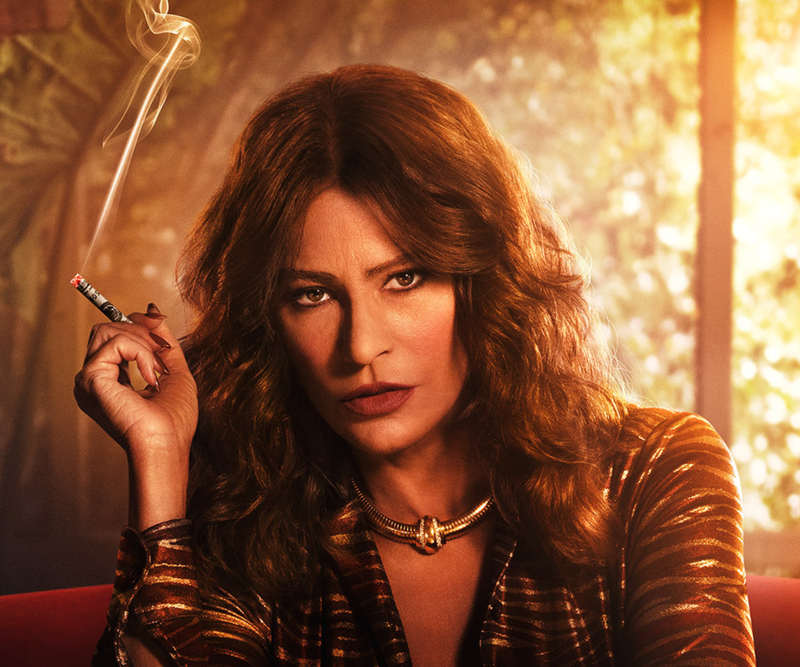Netflix has welcomed 2024 with a new release aligned with—and produced by the same team—the Narcos franchise. We are talking about Griselda, the new narco novela, and Sofía Vergara’s latest bet that has taken the worldwide audience by storm. The series features the Colombian superstar portraying Griselda Blanco, one of the fiercest leaders of the Colombian drug cartels.
However, this TV phenomenon has also awakened some old controversy regarding Latinxs’ international representation, as well as the contradictions in highlighting an empowered, strong mother and immigrant who is also a ruthless assassin and a merciless criminal.
Netflix’s Latest Release
Sofía Vergara returned to the small screen after her massive success in Modern Family with Griselda, a mini-series comprising 6 hour-long episodes. She not only acted, but also worked as an executive producer in this new release, that features popular TV stars from Colombia and Latin America, such as Alberto Guerra, Martín Rodríguez, Christian Tappan, Juliana Aidén Martinez, and Vanessa Ferlito. The cast also includes the name of Carolina Giraldo. Doesn’t sound familiar? That’s probably because most of us know her as Karol G. Yes, ‘La Bichota’ made her TV debut.
Not even one month after its release, the show already holds a gobsmacking success in online critic sites like Rotten Tomatoes or IMBd, with scores that put it next to similar productions such as Narcos or El Chapo. Griselda achieved a score of 88% on Rotten Tomatoes, while Narcos has a score of 89% on the same platform.
Who Was Griselda Blanco
Known by many nicknames such as La Madrina (“The Godmother”), La Jefa (“The Boss”), or La Viuda Negra (“The Black Widow”), Blanco entered the drug business when, in the seventies, she moved to Medellín from her birthplace in Cartagena de Indias, Colombia. In her new home in the US, she became one of the pioneers in cocaine trafficking and deployed a network of drug distribution across the country. During those days, she was responsible for several murders (including those of two of her husbands) and multiple kidnappings.
In 1985, Griselda was arrested, a conviction that forced her to stay for almost two decades in prison in the US before being deported back to Colombia in 2004. Eight years later, she was shot to death, putting an end to a life of crime with a firm grip and true grit.
Blanco’s status as a misfit appealed to Vergara: being a Latina immigrant, an outsider, was precisely the thing that gave Blanco the advantage to hire the 135,000 Cubans who traveled to the US in search of a better life. Of course, the actress didn’t empathize with the criminal offenses, but there was something in Griselda’s character that she couldn’t resist.
“I am Colombian, a mother, and an immigrant. As a woman, Griselda was judged and nowadays I know because of my accent I have to work extra hard and I get less opportunities. Because she was a woman she was able to get away with a lot and disappear when she needed to ―no one would expect a woman to be running a cartel that size. People think a woman could never be this evil,” Vergara said in a BBC article.
Not All Latinos are Narcos
Despite the TV show’s massive success, this narco-novela has been fighting critiques from the get-go, especially from Vergara and Blanco’s homeland. The main accusation is that Griselda “promotes crime” and that it paints a dark picture of Colombia by only focusing on its drug problem instead of telling the stories of hard-working, honest people.
“They make narco-novelas, they make narco-films, they live off the traqueta culture [drug violence] and do great damage to Colombia’s image abroad. Our country has so many stories of resilience, of overcoming, there are so many successful Colombians and life stories to tell,” said Roy Barreras, Colombia’s ambassador to the United Kingdom, in Spanish via X (ex Twitter).
The politician unleashed his rant in a Twitter thread and criticized other countries for only focusing on Colombia’s problems instead of what’s happening in “their own backyard.”
“Griselda Blanco? Colombia, land of hitmen and cocaine? That is the image of Colombia they export! They destroy every effort to position our country and its wonders! [...] Aren’t there gringo and Asian and European cartels? Is the image of their countries only their criminals? Make a series with your scum and leave Colombia in peace!” wrote Barreras via X.
His angry words caused the rise of one thousand comments from users either sharing Barreras’ point of view or arguing against it. Within the repercussions, Sofía Vergara herself commented on the matter both as the lead actress and as the executive producer.
“In part he is very, very right, there are many, many spectacular stories. I wasn’t lucky enough to get any of those stories, that any of the studios would listen to me to make it. But you take something that has to do with narcos and it's a fascination," said the actress in an interview with Jorge Ramos.
What These Stories Truly Tell
Nonetheless, Netlix’s obsession with drug dealers and criminals couldn’t exist if it weren’t for the audience who fuels it by binging on their narco novelas like hotcakes. In fact, Sofía Vergara herself has admitted to watching these shows with excitement, although she is aware of the negative consequences people like Griselda have brought to Colombia.
"We were very careful not to romanticize her [Griselda], not to make her a hero because she is not a hero, she is not a hero at all, she did a lot of damage, but she was a very interesting woman,” said the actress in an interview with Jorge Ramos.
Of course, thinking that the audience isn’t smart enough to tell that not all Latinxs are criminals like Griselda or Pablo Escobar is underestimating them. It would be like saying that all people who like American true crime shows believe all people from the US are serial killers or mass shooters. These shows are part of a genre, just like Italian Mafia movies or Korean thrillers. And watching latinos be narcos could be nothing more than a guilty pleasure.
As always, there are gray areas, liminal spaces that are difficult to categorize in blunt terms. No one is saying stereotypes aren’t wrong and hurtful to those who suffer them, but it is important to take a step back and see that these narco stories are also a fundamental part of Colombia and Latin America’s cultural narratives, constituting their own cinematic and literary genre.
In fact, these productions are a good way of shedding light on the country’s same old problems, just like Andrés Parra, the actor who portrayed Pablo Escobar in Escobar: El patrón del mal, said to defend Sofía Vergara and her latest release: “We are a society that likes to put garbage under the rug, we are like that husband who beats his wife, but at parties, he appears to be the perfect husband. We are scandalized by a series of narcos, but there is no problem with narcos continuing to finance our politicians, that doesn't harm the country's image,” said the actor in an interview with El Colombiano.
In his response, Parra uncovered the hypocrisy that lies behind the words of people who criticize TV productions like these, because they focus more on their screens than what is happening around them. “The series [Griselda] is the one that disburses all the anger and frustration when we should be dealing with what is really important, which is why we continue to be a state so closely related to drug trafficking,” said the celebrity in the same interview with El Colombiano.
At the end of the day, because of a massive advantage of income, resources, and positioning in the cultural market, is the US TV and film executives who orchestrate and create the image Latinxs have around the world, and that is the case for many other local productions of third-world countries who don’t have what it takes to compete with megacorporations such as Netflix or other streaming services. One thing is for sure: Griselda Blanco, for the most part, owns its Latinx narrative and is Latina-produced and starred.
These stories of pain and violence shouldn’t be addressed lightly, they should be told by the people who lived them and who have a more complex understanding of the nuances that are at the heart of these issues. Given the state of things, Latinxs must have the chance to control their narratives and have a louder say in other aspects apart from their cultural image.






